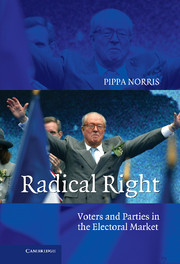Book contents
- Frontmatter
- Contents
- List of Tables
- List of Figures
- Preface and Acknowledgments
- Radical Right
- PART I UNDERSTANDING THE RADICAL RIGHT
- PART II THE REGULATED MARKETPLACE
- 4 Ballot Access and Campaign Finance
- 5 Electoral Systems
- PART III ELECTORAL DEMAND
- PART IV PARTY SUPPLY
- PART V CONSEQUENCES
- Notes
- Select Bibliography
- Index
4 - Ballot Access and Campaign Finance
Published online by Cambridge University Press: 03 December 2009
- Frontmatter
- Contents
- List of Tables
- List of Figures
- Preface and Acknowledgments
- Radical Right
- PART I UNDERSTANDING THE RADICAL RIGHT
- PART II THE REGULATED MARKETPLACE
- 4 Ballot Access and Campaign Finance
- 5 Electoral Systems
- PART III ELECTORAL DEMAND
- PART IV PARTY SUPPLY
- PART V CONSEQUENCES
- Notes
- Select Bibliography
- Index
Summary
Electoral laws and regulations structure opportunities for party competition within each country. Far from being neutral, these can provide formidable constitutional, legal, and administrative barriers for smaller parties. This chapter sets out a conceptual framework to understand these issues. The study then analyzes evidence for the impact of the formal rules and legal regulations governing all steps in the process of winning elected office, namely: (i) the nomination stage (including ballot access and party registration); (ii) the campaign stage (including the distribution of party funds, state subsidies, and access to party political broadcasts); and (in Chapter 5) (iii) the election stage (including the major type of electoral system, the effective threshold, and the use of compulsory voting). The study examines how formal rules governing this process influence the electoral fortunes of radical right parties, measured by their national share of votes and seats in legislative elections in the nations under comparison. The logic is straightforward: minor parties seeking to break into office (and thus many radical right parties) are generally expected to perform well in political systems which facilitate more egalitarian conditions of party competition, for example where all parties are equally entitled to ballot access, free campaign media, direct public funds, and indirect state subsidies. By contrast, minor parties face a harsher environment where such public resources are allocated in a ‘cartel’ arrangement biased toward established parties already in the legislature, thereby protecting incumbent politicians.
- Type
- Chapter
- Information
- Radical RightVoters and Parties in the Electoral Market, pp. 83 - 104Publisher: Cambridge University PressPrint publication year: 2005



